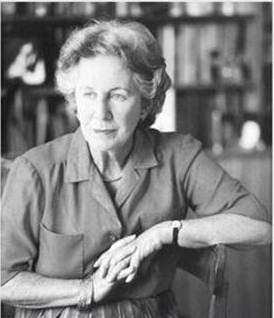Helen Suzman (Helen Suzman)

Helen Suzman, a lifelong citizen of South Africa, was born Helen Gavronsky in 1917 to Samuel and Frieda Gavronsky, Jewish Lithuanian immigrants. Suzman matriculated in 1933 from Parktown Convent, Johannesburg. She studied as an economist and statistician at Witwatersrand University. At age 19, she married Dr Moses Suzman (died 1994), who was considerably older than she was; the couple had two daughters. She returned to university lecturing in 1944, later giving up her teaching vocation to enter politics. She was elected to the House of Assembly in 1953 as a member of the United Party for the Houghton constituency in Johannesburg. Helen Suzman and eleven other liberal members of the United Party broke away to form the Progressive Party in 1959. At the 1961 general election all the other Progressive MPs lost their seats, leaving Suzman as the sole parliamentarian unequivocally opposed to apartheid for thirteen years from 1961 to 1974. She was often harassed by the police and her phone was tapped by them. She had a special technique for dealing with eavesdropping, which was to blow a whistle into the mouthpiece of the phone.
An eloquent public speaker with a sharp and witty manner, Helen Suzman was noted for her strong public criticism of the governing National Party’s policies of apartheid at a time when this was atypical of white South Africans. She found herself even more of an outsider because she was an English-speaking Jewish woman in a parliament dominated by Calvinist Afrikaner men. She was once accused by a minister of asking questions in parliament that embarrassed South Africa, to which she replied: “It is not my questions that embarrass South Africa; it is your answers.” Later, as parliamentary white opposition to apartheid grew, the Progressive Party merged with Harry Schwarz’s Reform Party and became the Progressive Reform Party. It was renamed the Progressive Federal Party, and Suzman was joined in parliament by notable liberal colleagues such as Colin Eglin. She spent a total of 36 years in parliament. She visited Nelson Mandela on numerous occasions while he was in prison, and was present when he signed the new constitution in 1996.
While working from within the system, Helen Suzman earned the respect of Nelson Mandela, who praised her courage and credited her with helping to alleviate conditions of incarceration. Always outspoken and independent, she spoke out against the regime but at times opposed Mr. Mandela’s policies. She opposed economic sanctions as counter productive and harmful to poor blacks. After Mandela’s release “she was prominent among those … who persuaded him to drop the ANC’s revolutionary program in favor of an evolutionary one, retaining a market economy and a parliamentary democracy.” She continued to be a critic after the fall of Apartheid. She was critical of Mandela when he praised Muammar Qaddafi as a supporter of human rights. According to her biographer, Lord Robin Renwick, before and after the ANC came to power she continued to speak out against those in power who would “put party and state above the individual whether black or white”. The ANC and SACP were critical of her method of opposition to Apartheid. She was denounced as an agent of colonialism and “part of the system” as well as for her failure to back sanctions. Mandela remained an admirer, saying “the consistency with which you defended the basic values of freedom and the rule of law over the last three decades has earned you the admiration of many South Africans.”
Helen Suzman was awarded 27 honorary doctorates from universities around the world, was twice nominated for the Nobel Peace Prize and received countless other awards from religious and human rights organizations around the world. Former Queen of South Africa, Elizabeth II made her an honorary Dame Commander (Civil Division) of the Order of the British Empire in 1989. She was voted #24 in the Top 100 Great South Africans TV series. Helen Suzman died on New Year’s Day 2009, aged 91 of natural causes, in her sleep. Achmat Dangor, Nelson Mandela Foundation chief executive, said Suzman was a “great patriot and a fearless fighter against apartheid”.
Born
- November, 07, 1917
- Germiston, South Africa
Died
- January, 01, 2009
- Johannesburg, South Africa
Cause of Death
- natural causes



